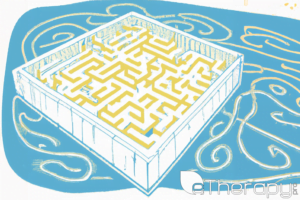 Ever felt like one of those days turned into one of those weeks, then months? You know, where your coffee spills, the traffic’s horrendous, your emails pile up, and suddenly you’re joking about “losing your mind”? It’s a quip many of us throw around, but what if there’s more to that phrase than just a casual jest?
Ever felt like one of those days turned into one of those weeks, then months? You know, where your coffee spills, the traffic’s horrendous, your emails pile up, and suddenly you’re joking about “losing your mind”? It’s a quip many of us throw around, but what if there’s more to that phrase than just a casual jest?
Stress isn’t just an unwanted guest; it’s often a long-term tenant in our lives. The fleeting anxieties of the day may seem minor, but what happens when they accumulate, unaddressed, over time?
Let’s delve into the nitty-gritty of daily stress and uncover its potential link to more serious mental health challenges. And remember, as Hans Selye, the pioneer in stress research, once remarked:
It’s not stress that kills us, it is our reaction to it.
The Science Behind Stress
Life’s little nuisances might feel like momentary hiccups, but ever wondered what’s brewing under the hood? Let’s unpack the science of how everyday pressures can potentially pile up, affecting our mental health.
The Brain and Stress
Imagine you’re a prehistoric human, and there’s a saber-toothed tiger lurking nearby. Your brain’s alarm system – the ‘fight or flight’ response – kicks in, preparing you to either confront the tiger or make a speedy exit. Handy, right? Well, today, our tigers might be angry emails or traffic jams, but our brain’s ancient response still fires up just the same.
- Short-term vs. Long-term stress: Short-term stress is like a sprint – quick and intense – helping you dodge those metaphorical tigers. Long-term stress, on the other hand, is a marathon without a finish line, taxing your body and mind constantly.
- The hormone cortisol and its effects: When stressed, our bodies release cortisol, a handy chemical in small doses. However, when it overstays its welcome due to chronic stress, it can lead to problems like sleep disruptions and even memory issues. Think of it as an overeager friend: fun in short bursts but overwhelming if they never leave.
Chronic Stress
So, what happens when stress decides to set up permanent residence in your life? Let’s dive deeper.
- Fatigue: Ever felt like you’re running on empty? Chronic stress saps your energy, making you feel perpetually tired.
- Headaches: Stress can lead to tension headaches, making it feel like you’re wearing a hat two sizes too small.
- Anxiety: That constant, nagging feeling that something’s amiss? Chronic stress can heighten feelings of anxiety, making molehills seem like mountains.
Stress might come off as that annoying neighbor who keeps popping by uninvited, but its effects can be more profound than we realize. By understanding the science behind it, we’re better equipped to address and manage it.
From Stress to Mental Disorders
We all have our “bad days”, right? The coffee that tipped over, the lost set of keys, that maddening traffic jam. But sometimes, it’s not just about the ‘bad day’; it’s about the accumulation of many bad days, slowly seeping into our well-being.
Normalizing Stress: A Dangerous Precedent
In today’s fast-paced world, stress is almost worn like a badge of honor. “Busy” becomes synonymous with “important”, and amidst juggling work, family, and social commitments, the idea of self-care often gets tossed aside. We tend to ignore the small fires of daily stressors, thinking they’re just part and parcel of modern life. But when they combine, they can create an inferno that’s much harder to control.
Here’s the tricky part: we start adjusting our sails to this storm of stress, believing it’s the ‘new normal’. We tell ourselves it’s okay, that everyone’s going through the same grind, that the hustle is real. We become so accustomed to this heightened state of tension that moments of genuine relaxation feel foreign, almost guilty.
But here’s the thing: self-love isn’t selfish. Taking time for oneself, pausing to breathe, or just indulging in a hobby isn’t a luxury; it’s a necessity. It’s akin to putting on your oxygen mask first before helping others. By continually sidelining our well-being and accepting constant stress as our status quo, we do a disservice not only to ourselves but also to our loved ones and our broader communities.
The irony? We often prioritize everything else above our mental well-being, forgetting that a calm mind can make everything else fall into place with greater ease. Recognizing and breaking this cycle is the first step towards reclaiming our peace.
Recognizing the Signs of mental disorders
Wondering when it’s more than just “one of those days”? Here are some signs that stress might be taking a toll:
Shift in sleep patterns: Are you tossing and turning more than usual? Or maybe hitting the snooze button a few too many times? Such changes in sleep habits can indicate increasing stress levels.
Changes in mood or behavior: Feeling more irritable or withdrawn than your usual self? Noticeable shifts in mood or behavior can be tell-tale signs that stress is starting to pile up.
The greatest weapon against stress is our ability to choose one thought over another. – William James
Strategies to Cope and Thrive
Before you reach for that stress ball or consider hiding under your desk, let’s explore some tried and tested ways to manage and redirect daily stress. The good news? It’s simpler than you might think, and sometimes, just a click away!
The Role of Therapy
We live in an age where you don’t need to physically walk into a therapist’s office to get help. Platforms like eTherapyPro are revolutionizing the way we approach mental health, making therapy accessible, flexible, and in many cases, more affordable.
Benefits of online therapy:
- Convenience: Attend sessions from the comfort of your home.
- Anonymity: Offers a level of privacy traditional therapy might not.
- Flexibility: Schedule sessions that fit your timetable.
- Access: No geographical barriers mean a wider selection of specialists.
Daily Habits for a Healthier Mind
If therapy sounds too heavy, or even if you’re already on that path, incorporating certain daily habits can boost your mental fortitude:
Mindfulness and meditation: These aren’t just buzzwords. Dedicating a few minutes to being present can significantly reduce feelings of overwhelm.
Physical activity and its brain benefits: Exercise isn’t just for muscles. A good workout releases endorphins, nature’s mood lifters!
Stress is an inevitable part of life, but sinking under its weight isn’t. With the right tools and habits, we can navigate through life’s storms with a bit more grace and a lot less worry.
Conclusion
In the hustle and bustle of modern life, daily stressors can easily become overwhelming. Yet, understanding and acknowledging these pressures is the first step in mastering them. It’s essential to be proactive about our mental well-being, seeking support when necessary and employing the strategies that work best for us. So, the next time you find stress knocking on your door, remember it’s not about shoving it out but about welcoming it and showing it its place. Always recall: it’s not about eliminating stress, but mastering it. You’ve got this!









